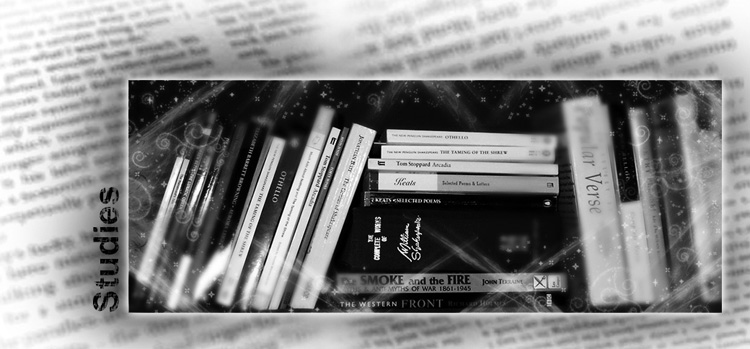(a) This extract comes from scene three. Thomasina and Septimus are having another lesson, in which Thomasina is attempting to translate some Latin lines about Cleopatra.
The 'Egyptian noodle' to whom Thomasina refers is Cleopatra. She deprecates Cleopatra's "all for love" behaviour, being at this stage too young to have experienced romantic love. The reference to 'carnal embrace' is a reference back to the first scene, in which Septimus offered her a highly idiosyncratic definition, which he revised after several uncomfortable minutes during which it became clear that it was he who was embracing Mrs Chater in this fashion. Septimus, being in love himself (with Lady Croom), is more sympathetic to Cleopatra. Their disagreement is one of the many instances of a conflict between logic and feeling in the play.
The main substance of Thomasina's first speech is a lament for lost knowledge, specifically in the burning of the library at Alexandria. She is far more moved by the loss of so many irreplaceable Greek plays than by Cleopatra's plight. Before the end of the play, we will learn that Thomasina herself is burned to ash, and her inspirations will also be lost.
Septimus offers consolation, in a speech which resonates with the discussion between Bernard, Valentine and Hannah in scene 5. Septimus suggests that the individual discoveries which were made will be (or have been) made again since, and indeed that modern discoveries were developed years ago and subsequently lost. Most poignant is the sentence: "Mathematical discoveries glimpsed and lost to view will have their time again." We will see this later, when Valentine understands what it was that Thomasina was trying to do, long after she and her insights were perished in the fire. This is not unlike Valentine's assertion that individual scientists are unimportant, because their discoveries will be made sooner or later anyway—the personalities of history do not matter to him.
However, Septimus also suggests that the loss of the ancient plays is unimportant because they will be written again, in other languages. This contrasts with Bernard's belief that poets and writers are vastly important because only the individual poet can offer his own special vision.
Septimus' analogy of life as 'the procession' suggests that life has an ultimate destination. This is completely opposed to the theme of entropy, and also to the demonstration Stoppard is giving us that information can indeed be lost, when he shows Hannah and Bernard struggling to make sense of the tidbits they can find to explain the past. (Although the lesson book, which he assumes will be lost, is one piece of evidence that will remain.) Septimus' idea is rather consoling, but set against the other ideas presented in the play, pretty well completely wrong. He has forgotten the lesson of the rice pudding. It may be that he is supposed to be inventing his theory of life as he goes along—at any rate, he is inventing wildly and without any proof to back up his ideas (rather like Bernard), for instance, when he asserts that the improved steam-driven heat-engine would have been described on papyrus. However, this seems to be a very orderly and organised view of life and knowledge, so perhaps here it is Septimus who is being 'classical' while Thomasina, lamenting what cannot be changed, is being 'romantic'.
Immediately after this extract, the lesson reverts to the translation, and Thomasina soon realises that Septimus has been cheating, using a Latin translation of Shakespeare's play. Furious at the unfairness in a way that very clearly demonstrates that she is still a child, however precocious, she exits, announcing "I hope you die!" Immediately after that, Chater arrives to renew his challenge to Septimus.
(b) The second extract is from scene seven. Bernard has published his theory, to great acclaim; Valentine is fed up with his work on the grouse, particularly after the bruising attack of rhetoric by Bernard.
Hannah, more solidly centred than Bernard, has never been so excited by the prospect of fame which can follow literary/historical discoveries, and here she expresses what she really believes. "It's wanting to know that makes us matter." Unlike Bernard (who wants to be right), Hannah wants to learn, and she finds the struggle such a necessary part of her progress that she is angry at the thought of an afterlife in which all the answers are simply handed out. She shares this longing for knowledge with Thomasina, who lamented the lost plays. Valentine's priorities are similar—he is not interested in who did what, but in what progress was made. These are the characters who strive to find order in chaos.
Immediately after this speech, we find that Valentine has progressed Thomasina's work, and achieved something interesting and beautiful. We then discover that Thomasina died in a fire on the eve of her seventeenth birthday—her ideas were lost just like the library at Alexandria.
